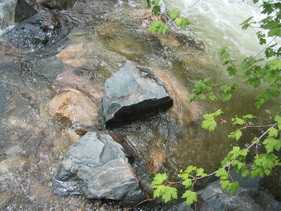 Grizzly Creek in Glenwood Springs, CO
Grizzly Creek in Glenwood Springs, CO Greetings new readers and welcome to the Living Balance Blog!
Todays topic is Water, and how it can impact your pet's health, both positively and negatively. You may be surprised at its preventative power! Among water's many gifts: vigor, freedom of movement, clarity and the ability to heal. Arguably the most important of the elements, water is essential to our very existence. Each cell in our bodies requires delivery of vital nutrients as well as the continual removal of metabolic waste products every second of every day.
Without sufficient fluid, cells shrink, tissues become less elastic, blood flow becomes sluggish and we feel fatigued. With prolonged fluid imbalance, cellular function suffers and tissues start to fail. Joints become stiff, muscles become tight, skin dries and cracks, and organ function declines. Under such conditions, the kidneys and colon become strained over time with the need to conserve water, and will eventually develop such problems as renal failure, constipation and bladder stones. It can be said that chronic dehydration contributes to much of the pain and illness we generally consider to be part of 'old age.'
Acupuncture relieves obstructions and can restore flow, but only if there is enough fluid in the system to help get things moving! Dehydration is a common problem in veterinary patients and many chronic or emergent conditions can be resolved simply through rehydration. This is a recurring theme in the emergency room, especially in patients with vomiting and diarrhea. Without intervention, we hydrate primarily by drinking. This means that our gastrointestinal (GI) tract has to be functioning well enough to take in and absorb the water. When severely dehydrated, the GI tract tends to shut down or malfunction and injectable fluid therapy (intravenous or subcutaneous) is needed.
One of the best ways to prevent dehydration in our animal companions is to feed a canned or moist diet. Most pets and veterinary patients in the United States are eating dry food -- mostly because it is convenient, cost-effective and does not spoil easily. Unfortunately, the processing of dry food destroys much of the nutritional value of the ingredients, and the resulting kibble contains far less moisture than dogs and cats would usually get from their food if they were hunting and eating fresh meat. Making sure plenty of fresh water is always available and feeding canned or home-cooked diets can not only help keep your pet out of the hospital but can also help avoid more serious problems later in life!
Todays topic is Water, and how it can impact your pet's health, both positively and negatively. You may be surprised at its preventative power! Among water's many gifts: vigor, freedom of movement, clarity and the ability to heal. Arguably the most important of the elements, water is essential to our very existence. Each cell in our bodies requires delivery of vital nutrients as well as the continual removal of metabolic waste products every second of every day.
Without sufficient fluid, cells shrink, tissues become less elastic, blood flow becomes sluggish and we feel fatigued. With prolonged fluid imbalance, cellular function suffers and tissues start to fail. Joints become stiff, muscles become tight, skin dries and cracks, and organ function declines. Under such conditions, the kidneys and colon become strained over time with the need to conserve water, and will eventually develop such problems as renal failure, constipation and bladder stones. It can be said that chronic dehydration contributes to much of the pain and illness we generally consider to be part of 'old age.'
Acupuncture relieves obstructions and can restore flow, but only if there is enough fluid in the system to help get things moving! Dehydration is a common problem in veterinary patients and many chronic or emergent conditions can be resolved simply through rehydration. This is a recurring theme in the emergency room, especially in patients with vomiting and diarrhea. Without intervention, we hydrate primarily by drinking. This means that our gastrointestinal (GI) tract has to be functioning well enough to take in and absorb the water. When severely dehydrated, the GI tract tends to shut down or malfunction and injectable fluid therapy (intravenous or subcutaneous) is needed.
One of the best ways to prevent dehydration in our animal companions is to feed a canned or moist diet. Most pets and veterinary patients in the United States are eating dry food -- mostly because it is convenient, cost-effective and does not spoil easily. Unfortunately, the processing of dry food destroys much of the nutritional value of the ingredients, and the resulting kibble contains far less moisture than dogs and cats would usually get from their food if they were hunting and eating fresh meat. Making sure plenty of fresh water is always available and feeding canned or home-cooked diets can not only help keep your pet out of the hospital but can also help avoid more serious problems later in life!
 RSS Feed
RSS Feed